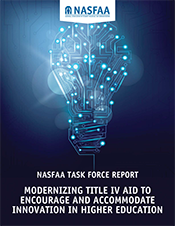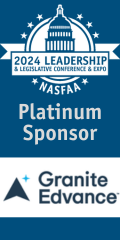Modernizing Title IV Aid to Encourage and Accommodate Innovation in Higher Education
 NASFAA convened the Modernizing Title IV Aid to Encourage and Accommodate Innovation in Higher Education task force over the spring of 2019 as an extension of 2015's Innovative Learning Models task force and in the context of the impending reauthorization of the Higher Education Act.
NASFAA convened the Modernizing Title IV Aid to Encourage and Accommodate Innovation in Higher Education task force over the spring of 2019 as an extension of 2015's Innovative Learning Models task force and in the context of the impending reauthorization of the Higher Education Act.
The task force was asked to:
- Meet with experts and pioneers in innovative learning models to better understand current and future trends
- Consider the implications and challenges of administering Title IV aid to these new types of programs under existing statutes and regulations.
- Examine specific Title IV eligibility and compliance barriers to innovation— including but not limited to Satisfactory Academic Progress (SAP), Return of Title IV Funds (R2T4), attendance, disbursement schedules, cost of attendance (COA), Pell scheduled award amounts, and annual loan limits.
- Formulate specific policy recommendations that would accommodate these types of programs while protecting the federal investment and providing for program integrity, including proposed statutory changes to be included in the reauthorization of the Higher Education Act of 1965.
- Identify potential future development or demonstration projects that would experiment with innovative learning models
In its work, the task force agreed that efforts to further foster innovation must include strong controls to prevent poor-performing programs and bad actors from gaining or maintaining eligibility to participate in the Title IV programs, in order to ensure that education quality is not a tradeoff for innovation. The group looked to international models for examples of how to balance controls to prevent fraud and abuse with providing the flexibility needed to innovate and experiment with new learning models. The group also consulted higher education policy experts to better inform their discussions.
Recommendations covered both broad, high-level policy topics such as lifting the student unit record ban, to more detailed operational recommendations like changes to measuring the quantitative component of Satisfactory Academic Progress and excluding certain student circumstances from the Return to Title IV Funds calculation requirement.
While endorsing many of the recommendations of the Innovative Learning Models task force, such as permitting Title IV aid for hybrid direct assessment programs and exempting from the Return to Title IV funds requirement programs that disburse aid in frequent, smaller installments, the group also made several new recommendations. Those include suggested improvements to the Experimental Sites Initiatives design and evaluation process to better inform policy decisions, and the creation of a federal funding source to incentivize software providers to make their products more amenable to innovative education delivery models.
Publication Date: 6/28/2019





